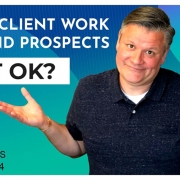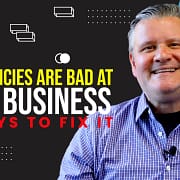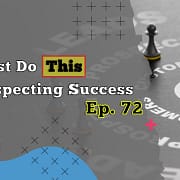Two accounts are a conflict. Three accounts make you a specialist agency.
I love that quote, and I got a question on using client work to land prospects and agency conflict of interest for small and mid-sized agencies that you’ll want to stick around for in this episode.
OK, I got a question from a longtime fan of the program, Dan from Baltimore, Maryland:
Something I’d love to hear more about is the use of client work to land prospects from the same industry. Is it ok? Permissions? Beg for forgiveness?”
The first thing I thought was, yes, agencies do that all the time with case studies, right?
But that’s not really what he meant.
So let’s dig into this topic.
First thing to point out, I’m leaving holding company agencies out of this conversation-potential conflicts get locked out or resolved very early in those situations, right?
I’m talking about those smaller agencies.
To Dan’s question, is it OK to share that work with prospects in the same industry?
First thing to ask-is there a non-compete in place?
Which leads to your first Takeaway:
Don’t sign a non-compete and do have a conflict policy in place.
In reality, this will not always work and you will have to sign that non-compete, but you should have a policy in place, in lieu of signing that, to at least give you an alternative you can offer that gives you some leeway, and doesn’t completely constrict your ability to work in that category.
And a bonus takeaway here- if a non-compete is on the table with a new client, think really carefully, if you’re in a certain geographic market, can you charge them what you need to justify that exclusivity?
Can be tough.
But let’s say you’ve already signed that non-compete, or more often with small to mid-sized agencies, it’s understood that you won’t be going after competitors.
It turns into a gray area, right?
There are less AOR’s, more project work, and how broad a definition does a client consider a conflict?
So you have those clients that are sacrosanct-we’re not going after anyone even close to what they do-too important a client.
Then you have those clients who do not care-go for it.
It’s that middle ground Dan is asking about though, isn’t it.
And in those cases, it’s typically that geographically, you’re not going after a direct competitor in their backyard, and there’s not a formal non-compete.
So here’s your second takeaway:
Ask or beg for forgiveness.
Which I guess could be two different takeaways, but if ethically, you can plainly see that yes, this is similar work, but there is no direct competition-you can ask and explain, if you have that relationship with your client.
Or you can prospect those companies outside your client geo, and one-on-one with that prospect, not on your site, not in your content or email blasts, describe the work, possibly name drop the client to your prospect, and beg forgiveness IF it ever comes up.
But even that might feel, “I don’t know”, so the best way to handle is your third takeaway-
If you got this new client, would your existing client be unhappy about it?
It really is best to establish it up front wherever possible, especially because so much of it is situational and case-by case.




